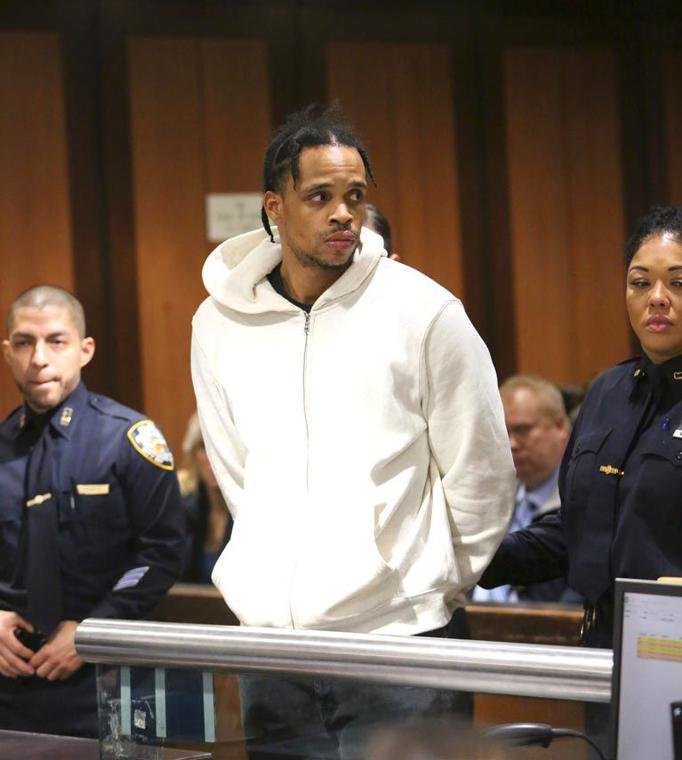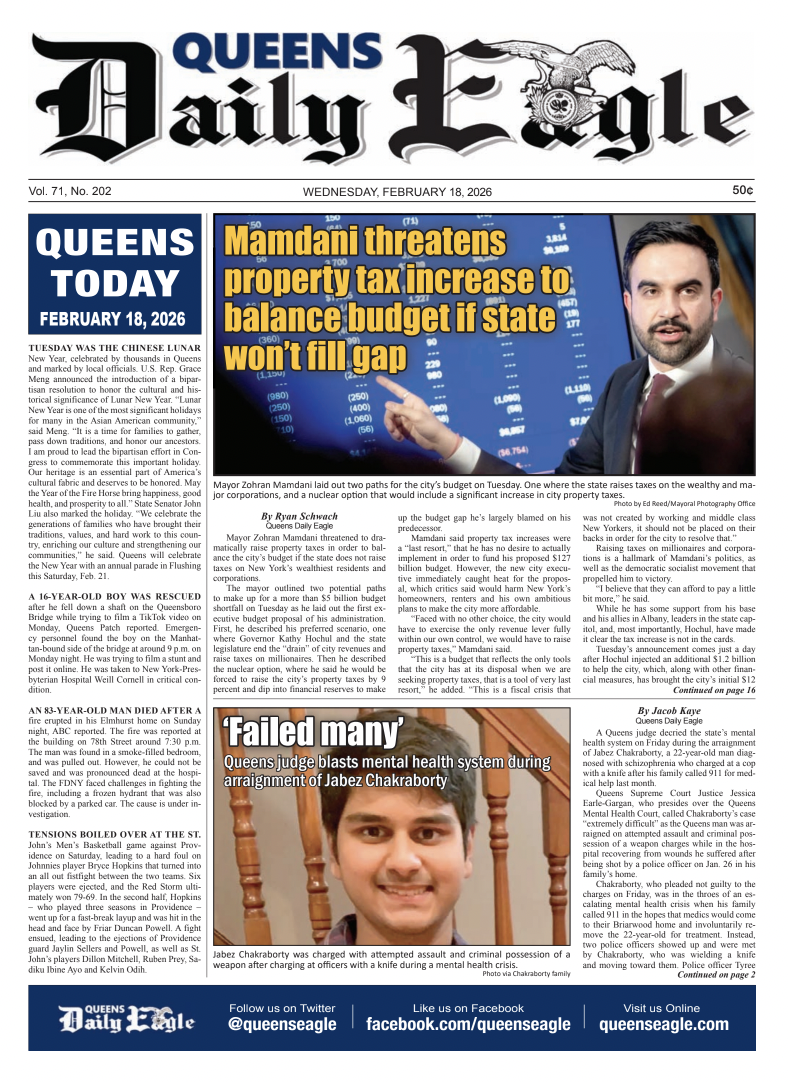Trial begins for man accused of murdering NYPD detective whose fellow officers pulled the trigger
/The murder trial of Jagger Freeman began on Tuesday, May 3, 2022. Freeman faces murder charges in the death of NYPD Detective Brian Simonsen who was shot by his fellow officers while responding to a Richmond Hill robbery in 2019. File pool photo by Ellis Kaplan
By Jacob Kaye
Queens prosecutors said Tuesday that in the days following a 2019 botched robbery that resulted in the friendly fire death of NYPD Detective Brain Simonsen, Jagger Freeman looked online to see if a civilian could be charged with murder if one police officer shoots another.
In New York, the answer is yes.
Freeman’s trial before Queens Supreme Court, Criminal Term Judge Kenneth Holder began Tuesday. The Queens man faces felony murder charges for the death of Simonsen, who was shot by a fellow officer when half a dozen cops responded to a robbery in progress in Richmond Hill in 2019. Freeman has pleaded not guilty to the 16-count indictment against him.
Though Freeman didn’t pull the trigger, Queens prosecutors are pursuing a murder charge, which is allowed in New York State – Freeman’s co-defendant, Christopher Ransom, was convicted of the same charge in October 2021.
The felony murder rule, which is used in over 40 states, says that if a death occurs during the commission of a felony, the death can be charged as murder for all participants in the alleged felony, even if they had no intention to kill or had no role in it.
However, Queens Assistant District Attorney Shawn Clark alleged Tuesday during his opening statement that Freeman had an outsized role in Simonsen’s death, setting in motion the chain of events that killed the 42-year-old detective.
Over a dozen NYPD members and Queens District Attorney Melinda Katz came out for the opening day of Freeman’s trial, which is expected to run for seven weeks.
Prosecutors painted Freeman as the orchestrater of the robbery of the T-Mobile store in Richmond Hill in February 2019 and of a separate robbery of a St. Albans T-Mobile store several days before. Clark told jurors Tuesday that a series of text messages collected after Freeman’s arrest showed that he and Ransom communicated before, during and after both of the February 2019 robberies.
Freeman allegedly reached out to Ransom, who lived in Brooklyn, and told him that should Ransom act as the muscle, stealing cash and tech from the phone store, Freeman would be able to sell the goods, splitting the profits afterward.
According to the indictment, the two got together to rob a T-Mobile store on Linden and Farmers Boulevard on Feb. 8, 2019. Freeman allegedly served as the look-out while Ransom went inside with a black ski mask pulled over his face, took out a fake gun and ordered several employees to give him cash from the register and inventory from the back room.
The robbery was successful and the pair began to plan a second, prosecutors said.
The plan didn’t change much the second time around for Freeman and Ransom, according to Clark.
On Feb. 12, 2019, Freeman allegedly checked into a Jamaica hotel and was soon joined by Ransom. The two then took a taxi to the Richmond Hill phone store located on the corner of Atlantic Avenue and 120th Street.
They arrived not long before the store was set to close at 6 p.m., prosecutors said. While Freeman watched from across the street, Ransom went in with a fake handgun and told the two employees to open up two safes in the back of the store, according to the charges.
A man outside had allegedly seen Ransom go into the store with the ski mask on, had seen him pull the fake gun on the two employees and then called the police.
Simonsen and NYPD Sergeant Matthew Gorman were the first to arrive at the scene – both would be shot by their fellow officers moments later.
By the time additional officers arrived, both Gorman and Simonsen waited outside the store as the uniformed officers made their way inside, law enforcement said. Ransom came out of the back room and charged toward the front door. Prosecutors say officers inside began to fire at Ransom, who was pointing his fake gun at them – prosecutors Tuesday repeatedly did not qualify the gun as fake during their opening statement. Police officers continued to fire, getting off 42 shots, when Ransom made his way out of the door toward Simonsen.
One of the shots fatally hit Simonsen in the chest, one hit Ransom’s testicles and one hit Gorman in the leg.
Freeman allegedly left the scene when the shots rang out but was arrested at a friend’s house several days later.
In his opening statement Tuesday, Freeman’s attorney Ronald Nir reminded jurors of Freeman’s presumed innocence and told them not to allow prosecutors to shift the burden of proof onto the defendant. However, he did not mention the felony murder charge.
Critics of the rule, which has been eliminated in both England and Canada, say that it disproportionately affects people of color, who account for a majority of felony cases in the five boroughs.
“New York is moving progressively toward criminal justice reform and we’re making great strides, but we’re still in the Dark Ages when it comes to having the felony murder statute,” Jamal Johnson, the director of Legal Aid’s Homicide Defense Task Force, told the Eagle in 2019. “It’s a senseless law that makes it easier to convict young black and brown men of murder and put them in jail for rest of their lives.”
It’s the only charge in New York that doesn’t require intent, or mens rea, according to Johnson.
“What is built into our law is this belief that individuals should be convicted of crimes that they committed and that they intended to commit — that’s mens rea,” he said. “For a charge that requires life [in prison] if convicted, to take away the mens rea element is profoundly unjust.”
Ransom, who was also charged under the rule, pleaded guilty to aggravated manslaughter charges in October 2021 and was sentenced to 33 years in prison several months later.
In several interviews with various media outlets including the New York Post and The City following his arrest, Ransom said that he wasn’t to blame for Simonsen’s death. In one interview he said that the robbery was a prank gone wrong, in another he said he wanted to commit “suicide by cop.”
“The accountability should be with the officers who shot [42] times,” Ransom told the Post. “They’re using me as a scapegoat. They’re pointing their fingers at me, but I’m pointing my finger at them.”
Freeman’s trial is expected to run through June 13.




